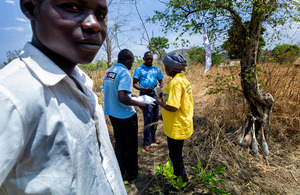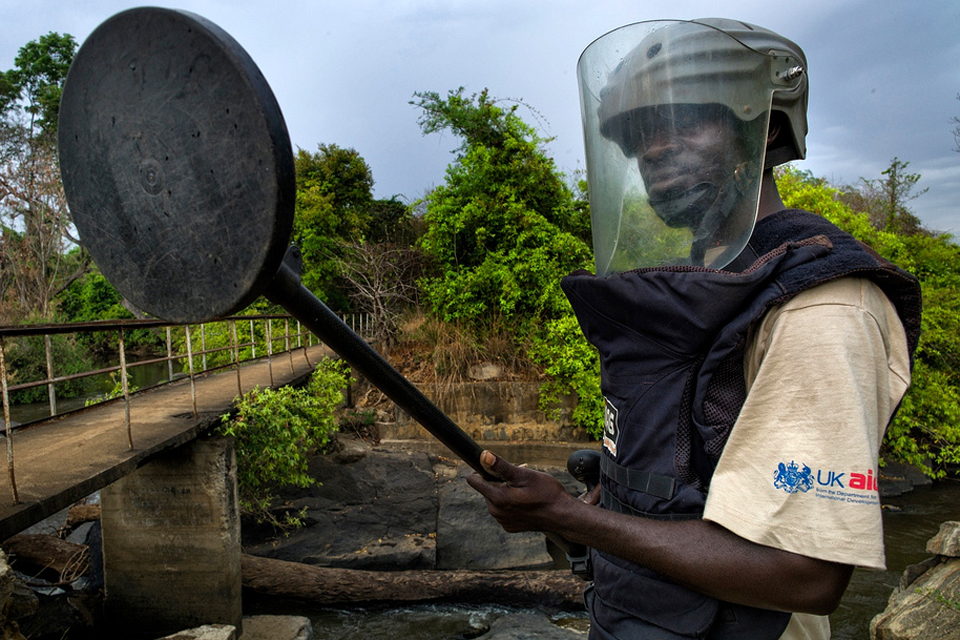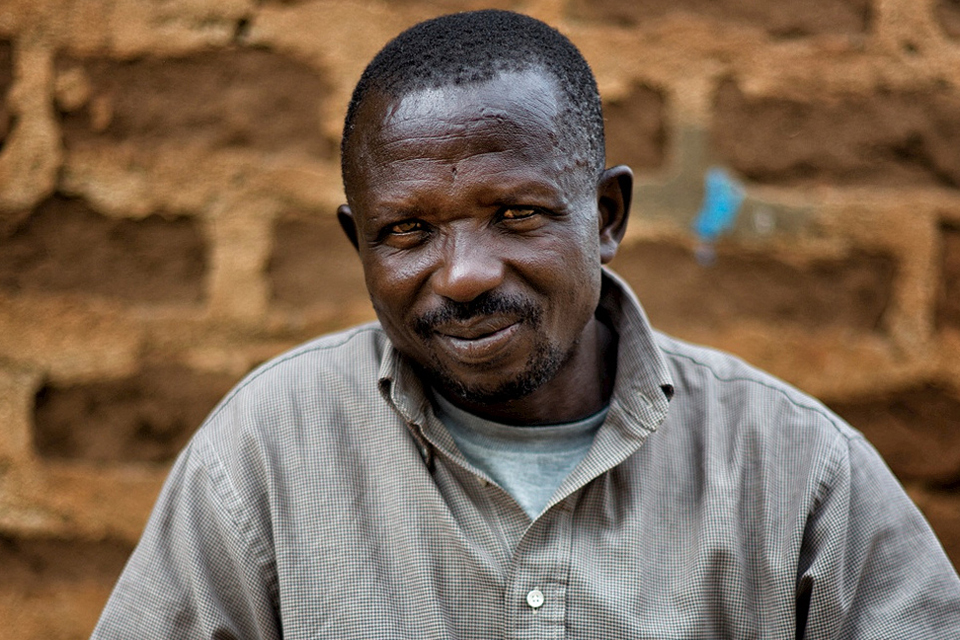Clearing land mines in South Sudan with MAG
How UK aid is helping remove the threat of land mines after two decades of conflict

Michael Bernado pictured with a MAG community liasion team close to unexploded grenades found near his village in South Sudan. Photo: MAG International / Sean Sutton
Land mines and explosive weapons are still devastating communities in South Sudan, a deadly legacy of more than two decades of conflict.
As the world observes International Mine Awareness Day on 4 April, support from UK aid is helping British charity MAG (Mines Advisory Group) to remove the threat of injury and death by clearing land of mines, helping communities to recover economically.

"We must clear more land so that we can rebuild our country" – MAG deminer, Santino Khamis. Photo: MAG International / Sean Sutton
In pictures: View more photos from this story on Flickr
Eighteen-year-old Michael points out the eight rocket-propelled grenades lying against a tree, just a few metres from his home in a remote part of South Sudan. Villagers in his community had found them in the field nearby, and, despite the dangers, had moved them out of the way. “The community have been very worried about them”, he explains.
“Traditionally vegetation is burnt off at this time of year and they were scared that they would be accidentally set off.”
Luckily, Michael has pointed them out to a MAG community liasion team working in the area. They have now logged the find and reported it, so that a properly trained bomb disposal team can come and destroy the items safely.
Hidden dangers
The stunning scenery around Kimodonge village, in eastern Equatoria State, belies the hidden dangers in the ground. Thick forest gives way to large stone outcrops, rounded and worn smooth by the elements; an inky black river runs through the rich valley and smoky-blue mountains crown the distant horizon.
“When we came back after the fighting ended, we knew that soldiers had been here and we were worried about landmines, but we didn’t know which areas were mined,” says Alfred Ohuda, community leader of Kimodonge village, near the town of Torit in Eastern Equatoria state.
“Then the school headmaster’s child stepped on a mine. He was only nine years old and he died. But this was a fertile area, and even though we were scared and knew there were mines, one of our villagers still tried to grow food on the land because we had so little. He found six mines.”

Alfred Ohuda, community leader, Kimodogne village. Photo: MAG International / Sean Sutton
Shells of buildings, many now reduced to rubble, are set in neat rows and hint at the village’s more peaceful past, when there had been the luxury of a functioning sewage system, and the development and emergency aid organisation Norwegian Church Aid had a base here, employing around 2,000 local people.
That was until the fighting Alfred refers to – part of the Second Sudanese Civil War – swept across the region in the mid-1980s, and the village was used as a military position, first by the Sudan People’s Liberation Army (SPLA) and then from 1992 by their opposition, the Sudanese Armed Forces (SAF).
The SAF defended the position with minefields along the banks of the river, and demolished the vehicle bridge crossing the river to prevent SPLA attacks.
A Comprehensive Peace Agreement was signed in 2005 to officially end the war, but while the army left, the mines remained, threatening lives and limbs, and preventing access to desperately needed farming land.
MAG teams have set up a temporary tented camp in the area and last week teams began clearance of the minefield.
“We were tasked to come here as a priority by UNMAS [United Nations Mine Action Service, the coordinating body for landmine clearance],” explains MAG Technical Field Manager, Jack Frost. “There is plenty of evidence that mines have been laid here and it is clear to see why the SAF would use them to defend this position.”
Soon the area will be safe again. “The people here are grateful. I can say that we all feel joy at seeing MAG,” says Alfred. “Now we have to restrict our children[’s movements], but when you have cleared here, we will be able to move freely. We will be able to collect water, firewood and stones for building. We will be able to walk with no fear.”
“The people across the river have had no humanitarian help. No one could help them. Maybe now they will build a bridge and they will get boreholes. Norwegian Church Aid used to be here before. They used to help us a lot. It would be good if they came back.”
It’s all about development
“We need to clear, and then rebuild, our nation”, says Santino Khamis, a member of MAG South Sudan’s Multi-Task Team 3, which is funded by DFID.
“I am 26 years old and have been working with MAG since 2008. It is a good job and we are well trained. We want to make our country safe. Most of the structures are destroyed from 20 years of war and we must rebuild. Many people have still not come back to South Sudan because of the dangers in the ground. We need to clear and then rebuild our nation.
“Before MAG, I worked as a Community Development Officer for the Danish Refugee Council. My job was to work on community development plans for things like health and agriculture. When my contract ended, I joined MAG and in many ways the work is similar – it is related anyway. If you go to Pajok, where we have just finished a minefield, you can see why we work. It is all about development.”
“I would like to improve my skills and learn more. I am happy I can support my two-year-old daughter and my brother’s three children. That makes me proud. I have many dependants, actually. I would like to say to DFID that I am very grateful for the support to my country. We must do more. We must clear more land so that we can rebuild our country. That is all I want to say.”